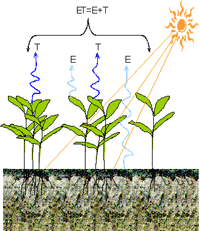Agricultural Research Division of IANR

West Central Research and Extension Center, North Platte
ORCID IDs
Date of this Version
2019
Citation
Agriculture 2019, 9, 124
Abstract
Adoption of cover crops has the potential to increase agricultural sustainability in the US and beyond. In 2017, a survey was conducted with Nebraska stakeholders in an attempt to evaluate current cover crop management strategies adopted in soybean (Glycine max [L.] Merr.), field corn (Zea mays L.), and seed corn production. Eighty-two Nebraska stakeholders answered the survey, of which 80% identified themselves as growers. Eighty-seven percent of respondents manage cover crops, and the average cover crop ha planted on a per farm basis is 32%. The primary method of establishing cover crops following soybeans and field corn is drilling. In seed corn, interseeding is the main seeding strategy for cover crop establishment. Cereal rye (Secale cereale L.) appeared as the most adopted cover crop species (either alone or in mixtures with radish [Raphanus sativus L.] or hairy vetch [Vicia villosa Roth]). Over 95% of respondents utilize herbicides for cover crop termination in the spring before crop planting. Glyphosate is used by 100% of survey respondents that use herbicides for cover crop termination. The major observed impacts of incorporating cover crops into a production system according to survey respondents are reduced soil erosion and weed suppression. According to 93% of respondents, cover crops improve weed control by suppressing winter and/or summer annual weed species. The biggest challenge reported by cover crop adopters is planting and establishing a decent stand before winter. According to the results of this survey, there are different management strategies, positive outcomes, and challenges that accompany cover crop adoption in Nebraska. These results will help growers, agronomists, and researchers better guide cover crop adoption, management, and future research and education needs in Nebraska and beyond.


Comments
© 2019 by the authors.
Open access
doi:10.3390/agriculture9060124